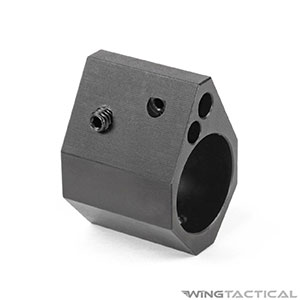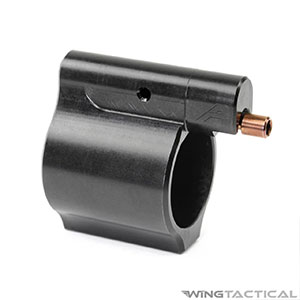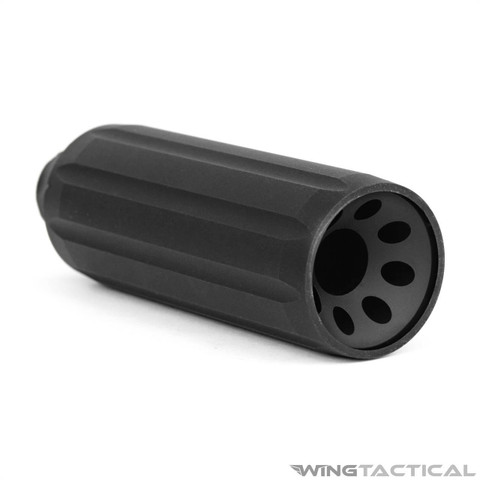No matter what you’re using your AR-15 for, having a reliable gas system for it will be essential to achieving the best possible performance. Gas blocks for an AR-15 are some of the most significant parts in gas systems. A gas block captures and directs gasses necessary to cycle the action and maintain reliable function. By investing in the right gas block for an AR-15, you can get the most out of it and make it more dependable.

What Are Gas Blocks for an AR-15?
Often overlooked, a gas block is a small device placed over the hole in the top of the barrel of your AR-15. When you fire a round, hot gas is released and travels through the barrel, where it escapes through the hole beneath the gas block. Gas blocks for an AR-15 direct this gas through the gas tube and back into the receiver so it can push the bolt carrier group rearward and cycle the action.
A gas block works as a valve controlling the amount of hot gas that enters the receiver. Most standard AR-15s used fixed gas blocks, meaning no matter what ammunition you use or what you’re using it for, the same amount of gas will pass through it. However, it is possible to upgrade to one of many adjustable gas blocks for an AR-15 available through Wing Tactical to take more control over the amount of gas that enters your receiver, allowing you to make sure your gun is getting what it needs.

Standard Gas Blocks for an AR-15
One of the standard gas blocks for an AR-15, like this Kaw Valley Precision Standard AR-15 Gas Block, will be very intuitive and easy to use with your rifle. It’ll allow the same amount of gas to flow through your gas block with every shot you take. It’s a terrific option for those who don’t want to have to worry about making adjustments to a gas block while using an AR-15.

Adjustable Gas Blocks for an AR-15
Unlike standard gas blocks, adjustable gas blocks for an AR-15, like this Aero Precision Adjustable Gas Block, will enable you to increase or decrease the amount of gas ported to your rifle’s upper receiver. Since different ammo generates different amounts of pressure, the adjustable capability lets you ensure your action receives the right amount to cycle reliably without incurring excess recoil, carbon buildup, or wear and tear. It’s a great choice for those who would like to take better control of an AR-15 with a gas block.
Wing Tactical: High-Quality Gas Blocks and Other AR-15 Components
Wing Tactical specializes in providing the best rifle and handgun components and accessories in the business to everyone from active duty military personnel and first responders to civilian gun owners and competition shooters.
Armed with about a decade of experience, our veteran-founded company understands how important it is for you to be able to get your hands on gun parts that will prove to be both reliable and performance-driven. We test each and every product we sell ourselves and promise we won’t ever set you up with parts we wouldn’t use when putting together our own builds.
Whether you’re interested in taking your rifle to the next level with one of our gas blocks for an AR-15 or you would like to discover more about how a gas block or another rifle or handgun component works, you can count on our team to assist you. Touch base with our experienced experts to get answers to your questions.
Frequently Asked Questions
Will using an adjustable gas block really make a difference for me?
What size gas block do I need?
Since AR-15 barrels come in different diameters, you will need to size your gas block to your barrel for correct fit and function. The most common barrel profiles and their measurements are:
- Pencil barrels: A skinnier, lightweight barrel type will use a .625-inch gas block.
- Standard barrels: The most common barrel size for an AR-15, a standard profile will need a .750-inch gas block.
- Bull barrels: The heaviest, bulkiest option to install on your AR-15 uses the largest gas blocks. Models for bull barrels will measure between .875 inches and .936 inches in interior diameter.
Does gas length matter?
Selecting the right gas length is very important because it’ll have an impact on the dwell time of your AR-15. The dwell time refers to the amount of time that ammunition spends in your rifle’s barrel once it makes its way past the gas port. After the bullet makes it past this point, the gas from it will begin to expand and create pressure. If too much of this pressure builds up in your barrel, it can direct too much gas to your bolt carrier group, which can cause excessive recoil and result in your firearm wearing out much quicker than it should.
What do I need to install a gas block?
The installation process for most of the gas blocks for an AR-15 is very simple and straightforward. Before you begin, you'll want to have a 1/8-inch hex wrench and a 5/64-inch roll pin punch. As for the parts you'll need to install a gas block properly, gather the gas tube, gas tube pin, gas block, and set screws.
The steps to install this gas block include:
- Clean your new parts.
- Insert the gas tube into the gas block, taking care to align the holes.
- Using the punch, push the gas tube through the gas block to secure the tube in place.
- Slide your gas block onto the barrel and ensure it is correctly aligned with the gas port.
- Tighten the set screws into the dimples on the underside of the barrel to secure your block in place. If your barrel doesn't have these depressions already, it's wise to visit a competent gunsmith to have them cut.






